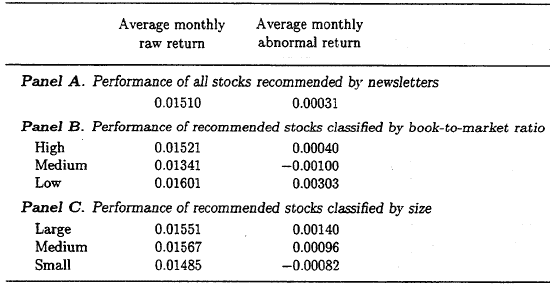Are newsletters good sources of stock picks? Specifically, do their recommendations persistently generate excess returns? In their October 1998 paper entitled “The Performance of Investment Newsletters”, Jeffrey Jaffe and James Mahoney tackle these questions. Using the investment newsletter archive of the Hulbert Financial Digest for 1980-1996, they determine that:
- Newsletters typically recommend 10-16 stocks. They tend to recommend growth rather than value stocks, smaller than the value-weighted average of market capitalizations. They generally encourage much higher turnover of holdings than that found among mutual funds.
- Newsletter common stock recommendations do not on average outperform appropriate benchmarks based on market capitalization, book-to-market and stock price. Including trading costs (and newsletter costs), newsletters likely underperform. Over the entire sample period, the mean monthly return of newsletter portfolios (without trading costs) is 1.32% versus 1.26% for the S&P 500 index.
- There is modest evidence of performance persistence based on raw returns, but not based on benchmarked returns. What persistence exists therefore may relate to investing style and not stock picking ability.
- Newsletters tend to recommend stocks with strong recent performance, but they do not herd on stock recommendations.
- Poor-performing newsletters have a greater likelihood of going out of business.
The following table, taken from this paper, provides the average raw and benchmarked returns (excluding trading costs) of newsletter stock portfolios. Benchmarking involves comparing returns for equally-weighted newsletter portfolios with those of equally-weighted portfolios of stocks with similar market capitalization, book-to-market and price characteristics. Results show that, after accounting for these general characteristics, the newsletters on average do not outperform. There is evidence that newsletters are better at recommending growth stocks than value stocks, but they show no special insight regarding small stocks.

In summary, newsletters on average offer investors/traders average performance, without the broad diversification benefit of mutual funds.